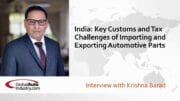Today’s cars and SUVs, packed with revolutionary technologies, are nothing like the vehicles of several decades ago. Nor is leadership among the world’s largest automakers, including General Motors ( GM ), Ford Motor ( F ) and Fiat Chrysler ( FCAU ), as the industry confronts one of the most transformational periods in its history.
The upstart, high-tech electric car maker Tesla ( TSLA ) has raised expectations on innovation, among consumers as well as in the industry itself. Japan’s Toyota Motor ( TM ) and the German brands Volkswagen (VLKAY) and Daimler (DDAIF) have become the world’s largest automakers by revenue, according to Fortune’s 2016 Global 500 list . (The 2017 list has yet to be released.)
GM and Ford, which dominated global auto sales in 2000 , have fallen off that perch.
Yet the largest automakers, including Toyota, have seen virtually no sales growth in recent years, even as China has revved up as an automotive powerhouse. Fiat Chrysler was unusual among the largest global automakers in growing sales in 2016, but even its impressive 15% revenue growth paled next to 67% for China’s Geely Automobile and and 48% for Dongfeng Motor.
Those shifts in leadership come as automakers face a technological revolution driven by electric, hybrid and self-driving vehicle technologies. A fundamental shake-up is also taking place in the global competitive sense, said Dave Andrea, executive vice president at Center for Automotive Research in Michigan.
“The industry has always been very complex and has always faced a lot of risk,” said Andrea. “But it has never faced so many issues and risk factors, and the magnitude and implications of those risks have never been so great.”
Automakers and components suppliers are reaching greater parity across the world, Andrea said. Korean carmaker Hyundai, for example, has successfully shed the early image for lower-tier products with which it entered the U.S. market. As the quality of cars made in Wuhan approaches those made in Dearborn, both automakers and their suppliers are forced to look for growth through vertical integration, joint ventures, major restructurings and even previously unimaginable pacts among themselves.
As one example of the “epic change” that is going on, Andrea cited last month’s announcement that the three major Japanese automakers, Toyota, Nissan (NSANY) and Honda Motor (HMC), are banding together to push forward hydrogen fuel-cell vehicles. GM’s decision to exit Europe earlier this year with the Opel-Vauxhall sale is another.
Auto Stocks Easily Outpace Market
For investors, Tesla, Ferrari (RACE) and Fiat Chrysler have been industry names to watch in 2017. Ferrari logged a 70% year-to-date gain through early Friday, and Fiat soared 31% while the S&P 500 has advanced roughly 11% in the same period. Tesla stock has gone on a 54% tear this year, despite falling back 15% from a June high.
IBD’S TAKE: The 15 stocks in the Auto Manufacturers industry have collectively soared 44% since the start of the year, the fourth-strongest gain among the 197 industries tracked by IBD , marking the group as a hotbed for market leadership.
The market in general, it’s safe to say, is excited about Tesla’s growth potential, especially as the company begins ramping up production for its mass-market Model 3 car. They are attracted to Ferrari’s strong profit-growth trajectory and superior pricing power. Fiat is a turnaround story offering improving margins and attractive valuations.
Automakers as diverse as Daimler, General Motors, Volkswagen and BMW (BMWYY) have seen their charts improve as value investors move in to buy on beaten down valuations. And while U.S. demand is trending lower after record sales in 2016, there are other reasons to be optimistic about an industry characterized by extreme economic sensitivity.
“Rising prosperity in emerging markets, led by China (even as growth there slows), should drive global-demand growth, and European demand should rise, partly offset by declines in some emerging markets,” equity analyst Efraim Levy at investment research firm CFRA wrote recently.
Tesla Prods Industry Innovation
For many investors, Tesla and its founder Elon Musk have become bywords for innovation. Tesla’s groundbreaking work in long-range and high-performance battery technologies will profoundly affect how the automotive industry looks in five years, said Ryan Issakainen, the ETF strategist behind First Trust NASDAQ Global Autos (CARZ).
To read entire article, please click here.
Source: NASDAQ – GAI




